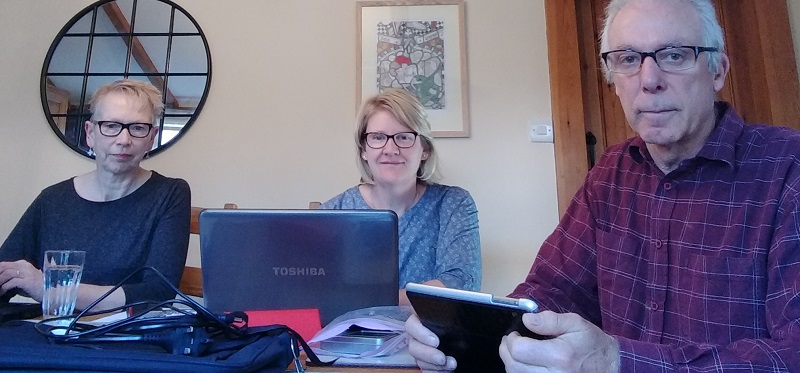Aberystwyth University researchers explore the resilience of UK farming

Left to right, the Aberystwyth University researchers; Susan Fowler, Dr Phillipa Nicholas-Davies and Professor Peter Midmore.
09 April 2018
Researchers at Aberystwyth University are studying the work of farmers in Wales as part of an EU wide study into the agricultural industry’s resilience and ability to respond to change.
The work by researchers at IBERS (Institute of Biological, Environmental and Rural Sciences) and Aberystwyth Business School focuses on the life stories of individual farmers in Wales working in the lamb and beef sectors.
The studies will contribute to the wider EU study which will help policy makers and the farming sector to become more sustainable and to develop farming systems which can better cope with uncertainty.
This will be of growing importance for UK farming post-Brexit and will contribute to the shape of the new British agricultural policy, where achieving improved resilience of the agricultural sector will be an important goal.
To deal with these and other future challenges, the EU-wide group of scientists who are working together as part of the SURE-Farm project will explore ways in which policymakers and agribusinesses can look beyond traditional strategies.
As well as Brexit, UK farmers face other uncertainties such as a significant reduction or loss of subsidies, access to plant protection products, labour costs, changing trade relationships and more volatile producer prices and exchange rate fluctuations.
These will be on top of the existing pressures of responding to shifting consumer preferences, public perceptions of agriculture and balancing farm business performance with environmental sustainability alongside continuing environmental risks such as extreme weather events.
Aberystwyth University and the Countryside and Community Research Institute (CCRI) at the University of Gloucestershire are the UK partners in SURE-Farm, which involves 11 case study regions across Europe.
Led by Professor Peter Midmore from the Aberystwyth Business School, the Aberystwyth team are also studying the resilience of arable farms in the east of England.
Professor Midmore said: “Our first study in Wales has emphasized the central importance of people, their passion, their health, their sense of responsibility and the long term view they take of the survival of family farms and the culture that goes with them.”
“Wherever the future UK agricultural policy ends up, the most important contributions to resilience will come from the agricultural sector itself. Farmers’ experimentation, innovation and farmer-to-farmer knowledge exchange are the bedrock on which farm financial viability rests”, he added.
The project is being coordinated by Wageningen University in the Netherlands and is led by Professor Miranda Meuwissen.
Professor Meuwissen said: “Challenges differ across agricultural areas in the European Union. For instance, some regions are more vulnerable to climatic or disease risks, while others face a change in consumer attitudes towards agriculture. This will have implications for the pathways towards developing the three capacities of resilience across Europe: robustness, adaptability and transformability. The strength of SURE-Farm is the breadth of its case studies across Europe, allowing for comparative analysis and sharing best practice resilience and risk management tools.”



